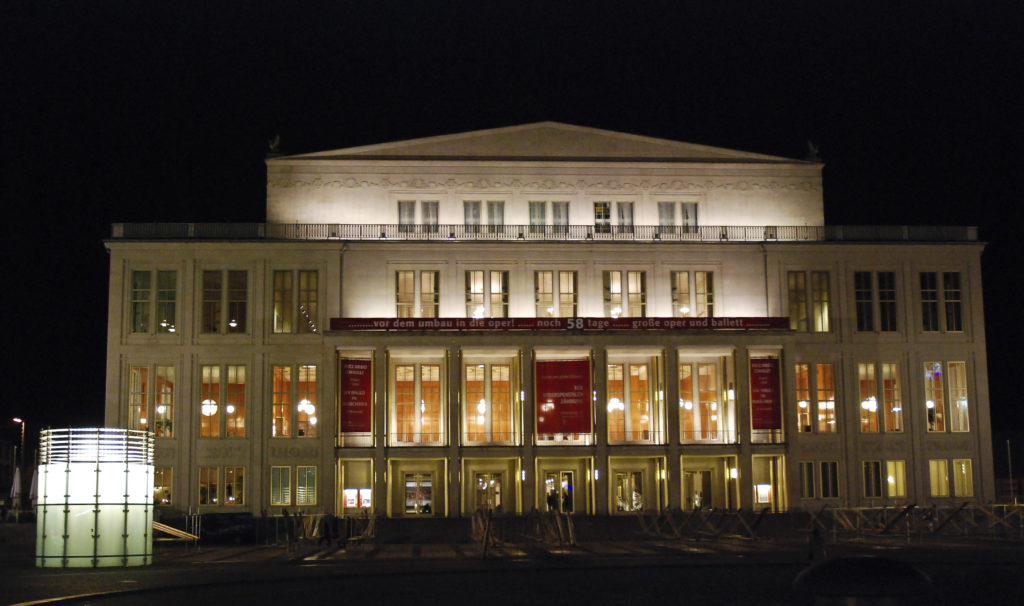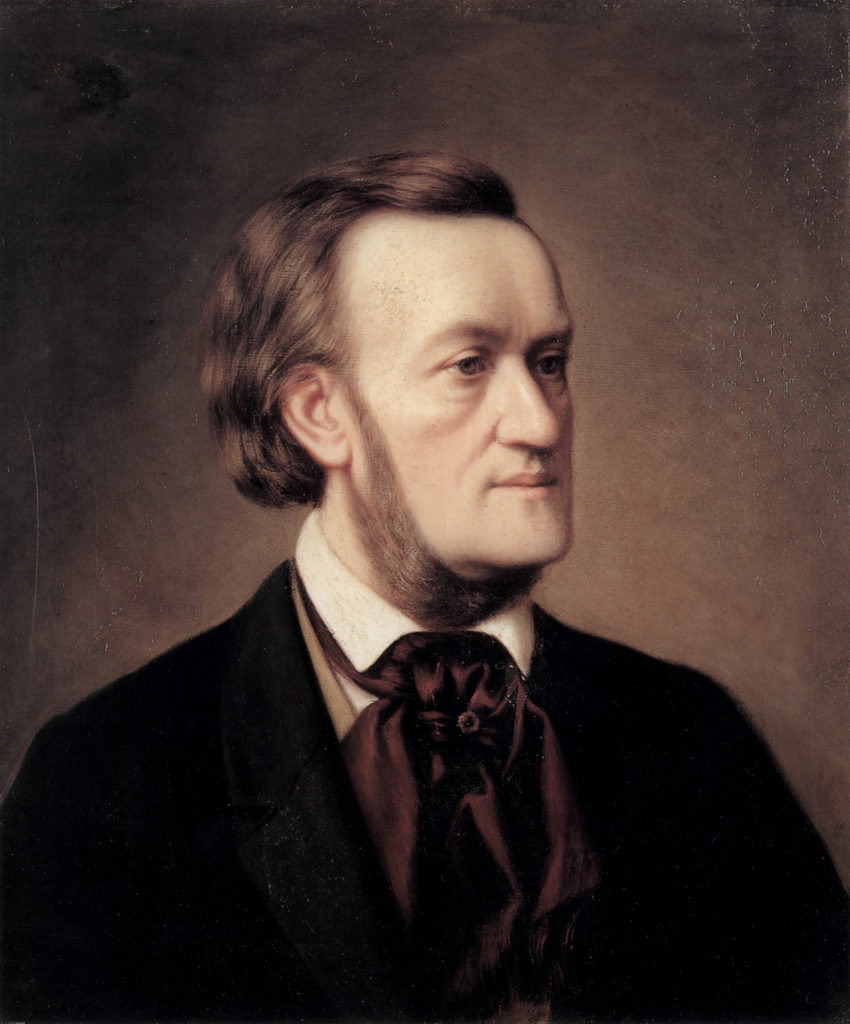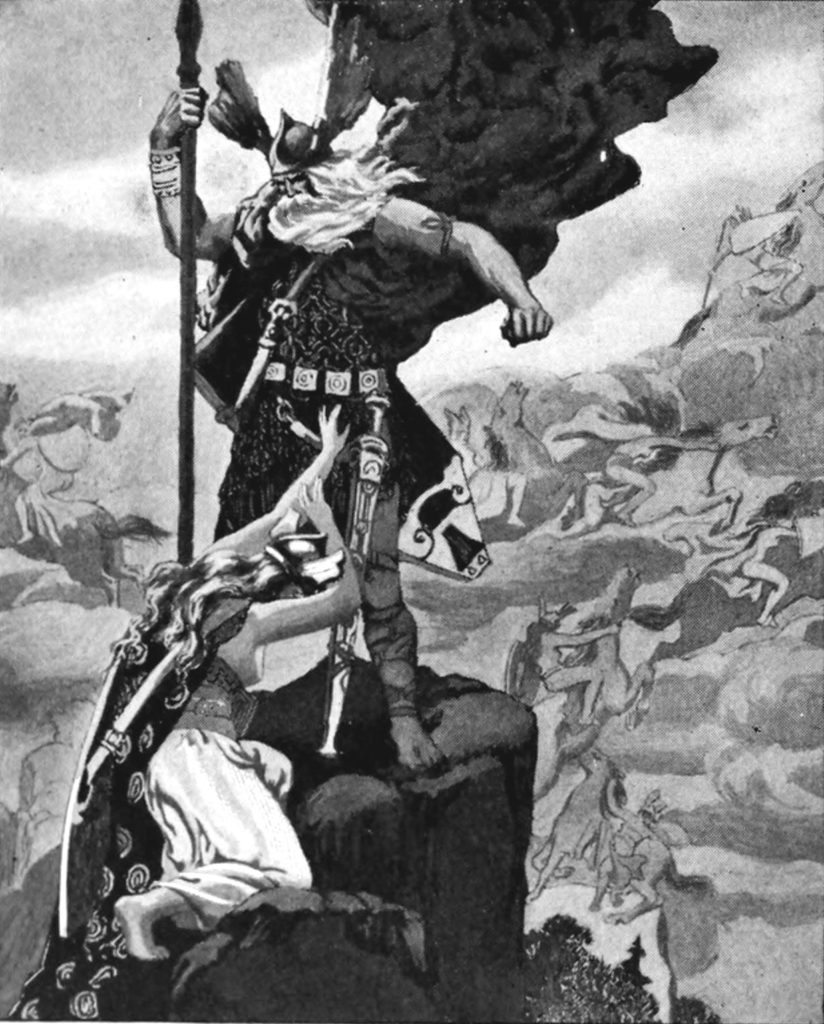
Opernhaus Leipzig
Oper Leipzig, The Ring
Wagner:The Ring of the Nibelung, Oper Leipzig, from 11th April 2018, directed by Rosamund Gilmore, conducted by Ulf Schirmer, reviewed by TONY COOPER
Leipzig is rich in musical history. Richard Wagner was born here, Felix Bartholdy Mendelssohn died here and Johann Sebastian Bach lived and worked here – from 1723 until his death in 1750 he was Kapellmeister at the Thomaskirche. Robert Schumann also resided in Leipzig and Georg Philipp Telemann worked there, too, while George Frideric Handel was born just up the road in Halle.
Wagner had a difficult start in his home town but Leipzig and Wagner are bound together in a common union. For one thing, the first complete performance of The Ring outside of Bayreuth took place in Leipzig in 1878.
So the return of The Ring to Leipzig for the first time in over forty years – one of the prime initiatives of Ulf Schirmer on his appointment as musical director of Oper Leipzig in the 2009/10 season – is to be applauded.
Like Frank Castorf’s Bayreuth Ring, Oper Leipzig’s production, conceived by the English-born director/choreographer Rosamund Gilmore, was mounted in celebration of the 200th anniversary of Wagner’s birth in 2013 starting, of course, with the première of Das Rheingold and building up to the first complete cycle in June 2016. No plans were on hand to revive it but the production is, gladly, still in the repertoire.
Not surprisingly, Ms Gilmore – who worked at Stuttgart with the former, well-respected Royal Ballet choreographer, John Cranko – incorporated dance in her production and to this end a troupe of 14 dancers complemented the overall stage action. And symbolism was an important factor too. For instance, a pair of rams represented Fricka and for Wotan, ravens, the latter, of course, a significant feature in Germanic-Norse mythology upon which The Ring is loosely based. On the death of Siegfried in Götterdämmerung, a pair of ravens hovered directly above him.
Costume designer Nicola Reichert came up with a wardrobe of amazing outfits, particularly for the trio of Rhine maidens, adorned with bridal-type floral headdresses which perfectly matched their colourful attire. Eun Yee You (Woglinde), Wallis Giunta (Wellgunde) and Sandra Fechner (Flosshilde) proved to be a formidable trio and were more than a handful for Alberich, sung handsomely by Jürgen Linn, tall, bullish as opposed to his down-trodden brother, Mime, convincingly sung by Dan Karlström.
Thomas Mohr put in a commanding performance as Loge, while Claudia Huckle as Erda, her richly-textured mezzo voice perfect for the part, appeared in Siegfried with a trio of dancers entwining her with the rope of the Norns, a prediction of the chaos to come. Her tête-à-tête with The Wanderer (Iain Paterson) in Siegfried was a telling moment.
Fricka and Freia were admirably sung by Karin Lovelius and Gal James while Kay Stiefermann and Sven Hjörleifsson gave a good account of themselves as Donner and Froh. As for the giants Fafner and Fasolt (James Moellenhoff and Rúni Brattaberg) they looked the part from head to toe dressed as for pantomime with bold tightfitting-patterned suits.

Richard Wagner by Caesar Willich
If the Rhine in Castorf’s Ring was portrayed by a peanut-shaped aquamarine swimming-pool, there were similarities in Ms Gilmore’s production, too. The designer, Carl Friedrich Oberle, came up with a wonderful and detailed set for Das Rheingold, placing the Rhine in a neo-classically-designed Roman bathhouse complete with saunas.
At the conclusion of Rheingold, the sweeping stone-spiral staircase of the bathhouse provided a handy route to Valhalla as a team of vassals carried Wotan’s belongings to his heavenly home. He and his entourage regally followed, with the rainbow bridge portrayed by a series of luminescent arc-like panels.
Christiane Libor as Brünnhilde squeezed every nuance from the part. Ditto the pairing of Robert Dean Smith and Meagan Miller in the ill-fated brother-sister roles of Siegmund and Sieglinde. Their impassioned duet at the end of the first act when they confess their love for each other was thrillingly sung, while Norwegian-born singer Rúni Brattaberg (Fasolt in Rheingold and Hagen in Götterdämmerung) took the sinister and mean role of Hunding conjuring up fear by his deep bass voice and by his devilish actions.

Wagner, Die Walküre
The second act of Walküre, focusing strongly on Wotan and Brünnhilde’s power struggle surrounding Siegmund winning the fight against Hunding, was played against a striking backdrop of a three-storied, Italianate building representing Valhalla.
Godlike, Wotan appeared in Das Rheingold in a deep-blue velvet-draped Roman toga adorned with a golden-coloured, laurel headdress.
The confrontation between Fricka, ironically, the Goddess of Marriage – played by Kathrin Göring – and Wotan over his adulterous and incestuous affairs hit the mark. She laid in to him in no uncertain terms but he ignored her plea in his usual arrogant and wayward manner in a scene which Iain Paterson handled well. His stage presence is second to none while his bass-baritone voice radiated round the vastness of the auditorium.
And to arm the warrior-maiden, Brünnhilde, Ms Gilmore decided on a First World War bayoneted rifle, while her loyal steed Grane was dramatically represented by Ziv Frenkel, a member of the dance troupe, who shadowed her every inch of the way and also acted as her general factotum. Brünnhilde’s team of eight hyperactive and attractive Valkyries, dressed in long-flowing military-type dresses, charged everywhere, brandishing their bayoneted rifles.
Dancers were to the fore in the first act of Siegfried holding court in a forest-like setting which looked more like a field of maize. The dancers commented upon everything and, surprisingly, one of their actions turned out to be the forging of the sword, Nothung. Ceremoniously, they handed the sword to Siegfried who earlier in the scene was seen tapping away at the smithy.
And the scene in which Siegfried – sung by Christian Franz but by Thomas Mohr in Götterdämmerung– gets the better of the dragon sending him empty handed to Hades, witnessed Fafner blown up to outrageous proportions spread out across an upholstered Louis XIV-style sofa. The old giant evidently splashed out on a bit of comfort with his newfound riches.
Fafner was also surrounded by a coterie of Artful Dodger characters, Fafner ‘look-a-likes’, sporting top-hats and enjoying the drinking and feasting that is Fafner’s raison-d’être. But he soon met his end at the tip of Siegfried’s sword, ditto poisonous, scheming Mime.
As Fafner lay dying, Siegfried, dithering and confused, looked forlorn. But that was short-lived as he had other business to attend to, seeking out his bride, Brünnhilde. And the Woodbird, sung so tenderly off-stage by Danae Kontora, was on hand to help him in his quest while Sandra Lommerzheim’s dance sequence fitted well into this much loved and delicate scene.
The ending of Siegfried proved difficult for the German tenor, Christian Franz, who has sung the role of Siegfried in many great houses. Although his voice was soft and lyrical in the middle register, it sounded raw and strained in the higher and, at times, he struggled against the pit.
But that well-loved scene in Gotterdammerung where Waltraute (Kathrin Göring) arrives unexpectedly to warn Brünnhilde to return the ring to the Rhinemaidens to end the dreaded curse – one of the loveliest passages in the whole of the cycle – was passionately sung (and acted) by Ms Göring, while Tuomas Pursio and Gal James made a brilliant team in the brother-sister roles of Gunther and Gutrune.
Another fine and powerful partnership in Gotterdammerung was that of Christiane Libor (Brünnhilde) and Thomas Mohr (Siegfried), consummate Wagnerian singers. Ms Libor excelled at the crucial point in the Ring’s scenario when Brünnhilde realises that lust, greed and corruption, encapsulating the dreaded curse, is inextricably tied to the ring.
However, Brünnhilde soon gets to grips with the matter and to ensure mankind can be rekindled to start afresh she humbly sacrifices herself while denouncing the gods for their guilt in Siegfried’s death. In the famous Immolation Scene, Ms Libor held the audience spellbound. Michael Röger conjured up some marvellous lighting effects mixed with a dash of pyrotechnical wizardry for the burning of Valhalla and the ending of the gods.
The Gewandhaus Orchestra, under Ulf Schirmer, were in a pit they know so well just over the road from their near acoustically-perfect concert-hall. The relationship between pit and stage was fairly balanced and in the big-production numbers such as The Ride of the Valkyries and Siegfried’s Rhine Journey, not forgetting Brünnhilde’s Immolation Scene – one of Wagner’s greatest achievements – Maestro Schirmer delivered a thrilling account of Wagner’s mesmeric and challenging score.
THE RING
Conductor: Ulf Schirmer
Director/Choreographer: Rosamund Gilmore
Set designer: Carl Friedrich Oberle
Costume designer: Nicola Reichert
Lighting designer: Michael Röger
Video designer: Andy Zabel
Dramaturg: Christian Geltinger
Opernchor
Gewandhausorchester
DAS RHEINGOLD
Wotan: Iain Paterson
Donner: Kay Stiefermann
Froh: Sven Hjörleifsson
Loge: Thomas Mohr
Fasolt: Rúni Brattaberg
Fafner: James Moellenhoff
Alberich: Jürgen Linn
Mime: Dan Karlström
Fricka: Karin Lovelius
Freia: Gal James
Erda: Claudia Huckle
Woglinde: Eun Yee You
Wellgunde: Wallis Giunta
Flosshilde: Sandra Fechner
Dance ensemble: Leila Bakhtali,Sidnei Brandão, Ole Driever,Ziv Frenkel, Unita Gay Galiluyo, Mathis Kleinschnittger, Elodie Lavoignat, Sandra Lommerzheim Juliette Rahon, Alexander Range, Alicia Varela Carballo, Jochen Vogel
DIE WALKÜRE
Siegmund: Robert Dean Smith
Sieglinde: Meagan Miller
Hunding: Rúni Brattaberg
Wotan: Iain Paterson
Brünnhilde: Christiane Libor
Fricka: Kathrin Göring
Gerhilde: Gal James
Ortlinde: Magdalena Hinterdobler
Waltraute; Monica Mascus
Schwertleite: Sandra Fechner
Helmwige: Daniela Köhler
Siegrune: Sandra Maxheimer
Grimgerde: Karin Lovelius
Rossweisse: Wallis Giunta
Grane: Ziv Frenkel
Loge: Jochen Vogel
Dance ensemble:Leila Bakhtali, Sidnei Brandão, Unita Gay Galiluyo, Elodie Lavoignat, Sandra Lommerzheim, Juliette Rahon, Ayako Toyama, Alicia Varela Carballo, Jochen Vogel
SIEGFRIED
Siegfried: Christian Franz
Mime: Dan Karlström
The Wanderer: Iain Paterson
Alberich: Jürgen Linn
Fafner: Rúni Barbaren
Erda: Claudia Huckle
Brünnhilde: Christiane Libor
The Woodbird: Danae Kontora
Dance ensemble: Leila Bakhtali, Sidnei Brandão, Ziv Frenkel, Unita Gay Galiluyo, Elodie Lavoignat, Sandra Lommerzheim, Martina Morasso, Juliette Rahon, Mathis Kleinschnittger, Ayako Toyama, Alicia Varela Carballo, Jochen Vogel
GÖTTERDÄMMERUNG
Siegfried: Thomas Mohr
Gunther: Tuomas Pursio
Alberich: Jürgen Linn
Hagen: Rúni Brattaberg
Brünnhilde: Christiane Libor
Gutrune: Gal James
Waltraute: Kathrin Göring
First Norn: Karin Lovelius
Second Norn: Kathrin Göring
Third Norn: Olena Tokar
Woglinde: Magdalena Hinterdobler
Wellgunde: Sandra Maxheimer
Flosshillde: Sandra Fechner
Dance ensemble: Sidnei Brandão,Ziv Frenkel, Unita Gay Galiluyo.Mathis Kleinschnittger, Elodie Lavoignat, Sandra Lommerzheim, Juliette Rahon, Ayako Toyama, Alicia Varela Carballo, Jochen Vogel
Access Oper Leipzig’s repertoire at www.oper-leipzig.de
Tony Cooper is QR‘s opera critic










